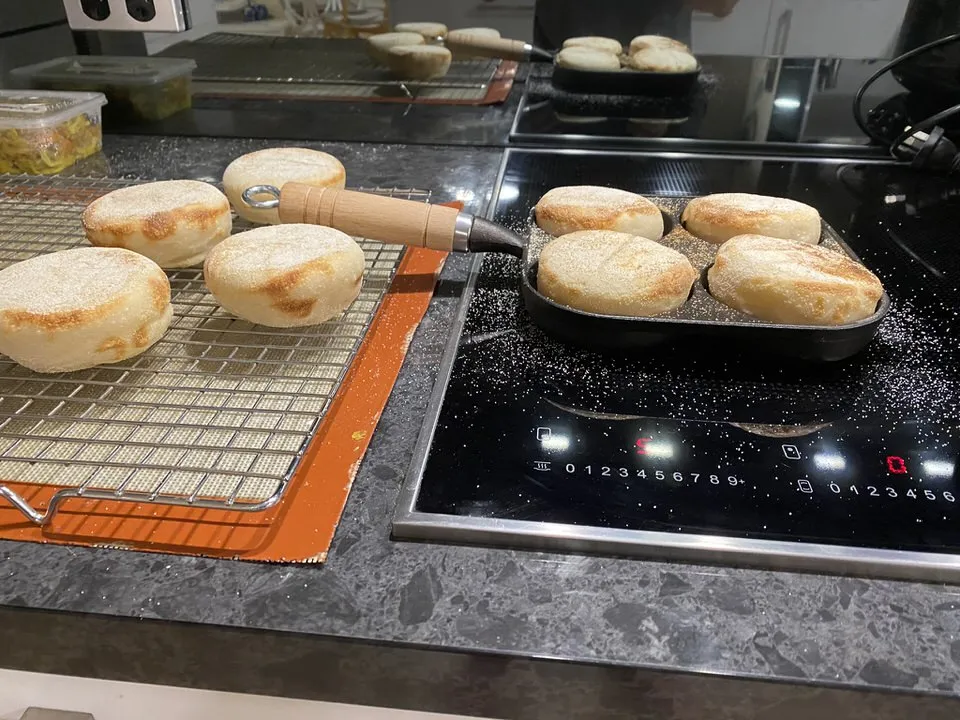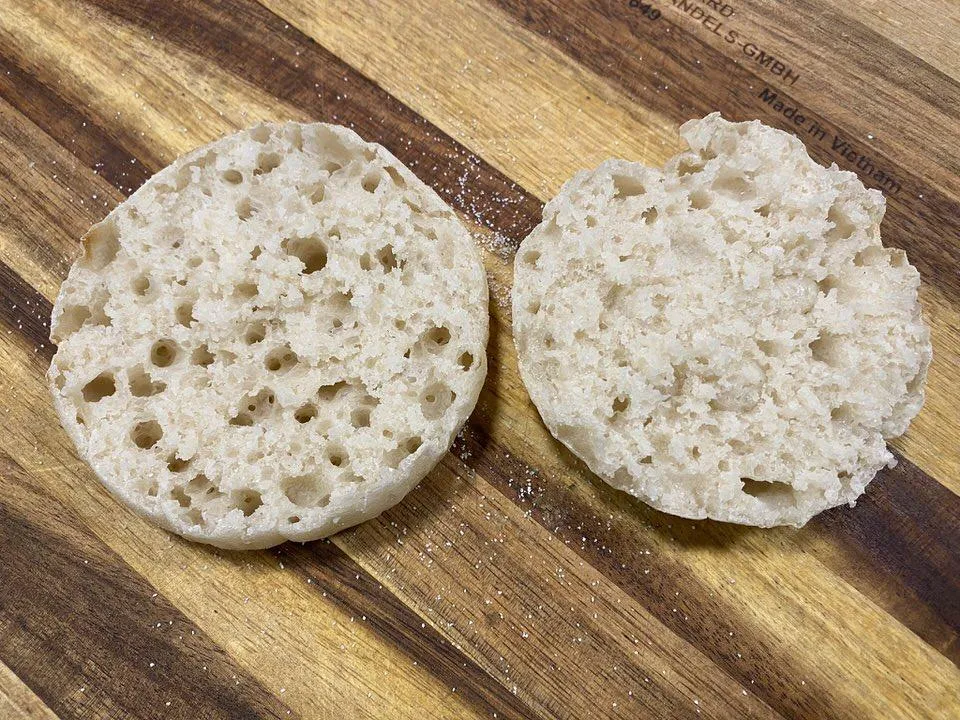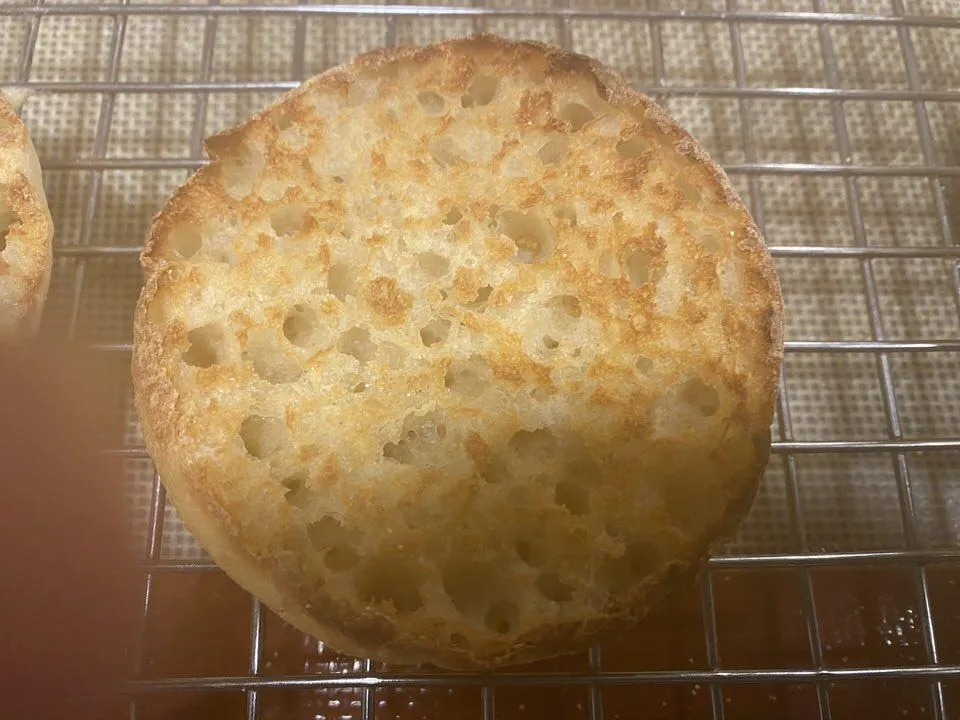
Debra Wink’s English Muffins with Biga.
I’ve tried several different English Muffin recipes and keep coming back to these, magnificent flavour and crumb.
Image
 Image
Image

- gavinc's Blog
- Log in or register to post comments
Those look fantastic! I like to make all sorts of griddle breads including English Muffins, but I don't think I've ever had the nook & crannies that those have. I bet they taste great.
Dave
Yeah, those look better than mine, too :)
Too kind. Helps to have a great mentor :)
Thanks Dave. Try opening them up using a fork by going around the edge perimeter. Push the fork in and the muffin will separate once you get all the way around.
Cheers,
Gavin
Gavin, thanks for giving me access to this wonderful recipe. I’m thrilled to have it.
for posting this. Does anyone know the diameter of the muffin rings. I have some rings that are 1-9/16th tall and 4-1/2 in diameter. Looking at the photos, they look to be 4 inches in diameter?
English muffins rings are 3.35" diameter wide and 1.25" high. Perfect for a 75-gram dough. The size you have would take a 95-gram dough I think.
EDIT: Debbie has corrected this in her comment below. Thanks.
Hi Rich,
The muffin rings in the linked photos and copied below that the 75g scaling is based on are 3.75" x 1.25". Yours will make much larger muffins (about 80% more volume) but nothing wrong with that if it suits you. You'll need to scale appropriately and maybe do five or six to a pan instead of eight if you're baking. If you're griddling the traditional way you can get by without rings and make them any size you want.
My best,
dw
Thanks for your comments.
The crumb looks nicely open on these Gavin, they look so inviting. Well done.
Benny
Cheers, Benny. They are delicious.
'''''''
I like to make English muffins with my standard sourdough - well, natural leavening since they are not actually sour. But I make a dough and don't use the rings, which I find to be a nuisance. The crumb isn't quite as open as these, but they are easy and delicious.
There two keys to making these muffins work out. First is "3-6-9". That means 3 oz of starter, 6 oz of water, and 9 oz of flour. The starter has 100% hydration.
Second, one problem with baking English muffins and similar products is that it can be hard to get the middle to cook enough before the outside gets overcooked and hard. I solved that by putting the muffins into a 250 - 300 deg F (120 - 150 C ) oven for 5 minutes after cooking each side in a skillet or griddle. That is enough to finish cooking the inside of the muffins.
I like to use 2.75 oz of dough for each muffin, though others might like 3 oz per for larger ones.
Oh, and you can use discarded starter if it's still in good shape.
So - a different style of recipe for English muffins with a preferment - you will be happy either way.
A sourdough version is well worth exploring. I know DW is experimenting with it, so I will let her chime in on this with any points.
The first few times I cooked them on the cast iron pan, I had the oven heated up ready to finish them in case they were taking on too much colour. I didn't need it so I don't prepare the oven now.
Cheers,
Gavin.
There two keys to making these muffins work out. First is "3-6-9". That means 3 oz of starter, 6 oz of water, and 9 oz of flour. The starter has 100% hydration.
Many here call this 123 sourdough, introduced to TFL by Flo Makanai almost 15 years ago. There was even a tenth anniversary community bake to celebrate it, so you're in good company :)
1.2.3, An Easy Formula for Sourdough Bread | The Fresh Loaf
Search | 123 sourdough
... it can be hard to get the middle to cook enough before the outside gets overcooked and hard
Your griddle may be too hot. I find the best surface temperature for griddling English muffins is 350F. And make sure the muffins are properly proofed, because if they're dense inside that can hinder cooking of the interior. I find that sourdough English muffins tend to be not quite as light as yeasted, and they don't toast the same.
I've tried it every which way over the years --- with firm (55% hydration) sourdough starter, liquid (100%) and even more liquid (120%). Personally, I got better results with the firm, although my preference remains the biga or sponge type preferment --- even over poolish and pate fermentee. I have to admit, that surprised me. Yes, I've actually done side-by-side tastings :)
But that's my preference, and I encourage others to discover their own. We're all different :)
Your griddle may be too hot. I find the best surface temperature for griddling English muffins is 350F.
That's about what I shoot for, say 325 - 350, as measured by my infrared thermometer. I could probably keep tinkering with the cook time and temperature, but I find that the oven finish make the whole process more tolerant of time, density, and temperature, so it's just become part of my routine.
There two keys to making these muffins work out. First is "3-6-9". That means 3 oz of starter, 6 oz of water, and 9 oz of flour. The starter has 100% hydration.
Many here call this 123 sourdough, introduced to TFL by Flo Makanai almost 15 years ago. There was even a tenth anniversary community bake to celebrate it, so you're in good company :)
First TRY Debra Wink’s English Muffins with Biga.
Cooked entirely on an electric griddle.
Those look fantastic Rich, nice job! I hope they toast and taste just as good for you as they look :)
They look great. I like the taste of these the best.
Cheers,
Gavin
please can I have the recipe for English muffin the link I tried to open it’s not opening please
https://www.dropbox.com/scl/fi/ek4q5aruaa8ci40ncwlo6/Debra-Wink-English-Muffins-with-Biga.docx?rlkey=fmfh05rmql3aj3eo7ovf8v7f3&dl=0
Cheers,
Gavin
I have been a Debra Wink fan since 2018, when I used her instructions for making a sourdough starter to replace the one I had started in 2012, which had grown moldy.
So, of course, I had to try these English Muffins with Biga. They were fine, but I did not get the "nooks & crannies" that I was looking for. So I made a sourdough version with a one hour warm bulk ferment, followed by a 20 hour cold ferment, and a final ambient proof, on parchment paper, of two hours after dividing, shaping, and placing into muffin rings. I then baked at 325°F on my oven's Convection Roast setting pretty much as Debra had described.
Somehow the body of your post is missing. Could you repost it, please?
I did a complete message with a couple of photos. Everything seemed okay until I clicked Post and then everything but the heading disappeared.
My post was about my respect for Debra Wink and my own experiments with sourdough English Muffins. I will post it again when I get a chance.
Oops, accidental repost.
Debra Sent me a message about how my prior message went out as an email, so here it is again
I have been a Debra Wink fan since 2018, when I used her instructions for making a sourdough starter to replace the one I had started in 2012, which had grown moldy. So, of course, I had to try these English Muffins with Biga. They were fine but I did not get the "nooks & crannies" that I was looking for. So I made a sourdough version with a one hour warm bulk ferment, followed by a 20 hour cold ferment, and a final ambient proof, on parchment paper, of two hours. After dividing, shaping, and placing into muffin rings. I then baked at 325°F on my oven's Convection Roast setting pretty much as Debra had described.
They came out pretty much the same as before, with perhaps a little improvement in the crumb structure. I usually use about 20% starter in my sourdoughs, but this time I used much more--about 66%, base on a YouTube video I had seen about making sourdough English Muffins. With about 66% water as well, the total hydration of this dough was about 75%.
I am happy withe the result.
I uploaded photos after posting the previous message, and got the message that they had been uploaded, but I don't know where they are.
You should be able to find your uploaded photos in your File Browser. If you click on your avatar or My Account, you'll be in the View tab. Look across the other tabs to the right of that and the File Browser tab can be found there.
There was one more step that you missed after uploading, and that was to insert it into your post, but you can go back in to edit the post and insert it now. With the cursor where you want the image, click the insert/edit image icon, and then the file search icon on the right of the source text box. It works the same way you did before, you just don't have to upload again. Select your photo from the list and then click insert. That will take you to another box where you can choose how you want it displayed. If you have any trouble figuring it out (you're not alone) feel free to ask for help :)
Thank you again.
So, here are photos of my bakes.
One-half of my sourdough batch
Knife cut
Fork split
A muffin from my previous batch using Debra's English Muffins with biga.
Not a great deal of difference in look or taste. I just prefer baking with sourdough.
They look really good, just right. Way to go!
TomP
The sourdough muffins look good. I haven't tried making them with sourdough as yet as I love the biga recipe. You may know this technique: I open the muffins by going around the edge with a fork and prying them open rather than cutting. The nooks and crannies are wonderful.
Cheers,
Gavin
I like the biga formula, also. I just prefer using sourdough for my bakes. As for opening English muffins with a fork or a knife, I did it both ways and posted a photo of each. The opening method affects the look, but not the taste or functionality of the muffins in my opinion.
Thank you and the others who have replied to my post, and thanks to Debra for her thoughtful tips.
I have also tried to make English muffins with my sourdough baguette formula, but they turned out a little too chewy for my taste.
Have you tried using sourdough as your preferment, but adding some yeast to the final dough? That may reduce the chewyness of sourdough only. (Or reduce the % flour prefermented.) You could also add some fat and milk to your formula to tenderize, more like a traditional English muffin. I took those things out of mine because they sacrificed some crispyness in the toasting.
In The Laurel's Kitchen Bread Book, Laurel Robertson wrote that to get the pockets knead the dough longer, adding more water as you do. I can't say this has ever really worked for me, but I probably didn't go far enough. The dough is too soft for baking in the oven in the rings unless you don't mind square edges.
Thanks Debra
That is very interesting, but when I mentioned chewiness, I was referring to the muffins that I made with my go to sourdough baguettes formula, which does have a very high percentage of prefermented flour, but lower overall hydration.
Neither your recipe nor the one I made with 100% sourdough was chewy. They were both light and tender. Mine had about 25% prefermented flour and total hydration of 75%.
That makes for a wet, sticky dough, but they baked up fine. Also, my formula has about 8% fat in it.
Everything is fine, but I would like to see "Thomas's" type holes.
I'll see what the results of today's bake is before II adjust anything else.
Thank you for your kind words, Kingfisher. Keep tweaking until you reach your ideal. Baking is convenient, especially for large numbers, but griddling may give you bigger pockets. If that doesn't do it, there are so many other factors you can fiddle with.